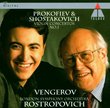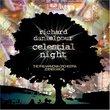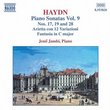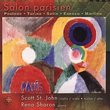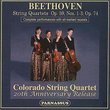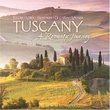| All Artists: Alexander Scriabin, Igor Golovschin, Moscow State Symphony Orchestra, Konstantin Scherbakov Title: Scriabin: Piano Concerto; Prometheus Members Wishing: 0 Total Copies: 0 Label: Naxos Original Release Date: 1/1/1999 Re-Release Date: 10/26/1999 Genre: Classical Styles: Opera & Classical Vocal, Forms & Genres, Concertos, Sonatas, Historical Periods, Modern, 20th, & 21st Century, Instruments, Keyboard, Symphonies Number of Discs: 1 SwapaCD Credits: 1 UPC: 730099581820 |
Search - Alexander Scriabin, Igor Golovschin, Moscow State Symphony Orchestra :: Scriabin: Piano Concerto; Prometheus
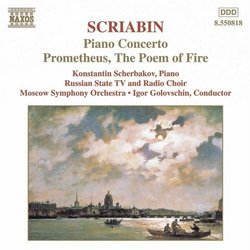 | Alexander Scriabin, Igor Golovschin, Moscow State Symphony Orchestra Scriabin: Piano Concerto; Prometheus Genre: Classical
|
Larger Image |
CD DetailsSimilarly Requested CDs
|
CD ReviewsDancing in the Divine Fire Thomas F. Bertonneau | Oswego, NY United States | 01/25/2001 (4 out of 5 stars) "Alexander Scriabin's (1872-1915) "Prometheus: Poem of Fire" (1915), like his much earlier Piano Concerto (1897), uses a keyboard in the concertante role, and the common instrumentation has led to the two works being coupled in recordings. (Since the advent of the CD, the "Poem of Ecstasy" [1908] is usually included with them, although it is a purely orchestral work.) Critics often remark that the Piano Concerto is derivatively Chopinesque and uncharacteristic, but this is not quite so. Much of the demonism in the music of Scriabin's major phase comes from the juxtaposition of massive chromatic chordal passages with balletic filigree in prominent solo parts. In "Prometheus," for example, the rapid arpeggios on keyboard often seem to float within a space defined by the surging thick textures of the orchestra, to which Scriabin adds choral vocalise and organ. In "Poem of Ecstasy," trumpet and violin alternatively take this solo role. Many moments in the Piano Concerto anticipate the developed effect. "Prometheus" likewise glances back at the Piano Concerto. The Naxos disc of the Piano Concerto and "Prometheus" features keyboardist Konstantin Scherbakov and conductor Igor Golovshchin leading the Moscow Symphony Orchestra. They give an amiable and relaxed traversal of the Concerto, drawing it out to twenty-eight minutes, longer than the norm. Among the lovely details are the woodwind solos in the Third Movement. In "Prometheus," Golovschin takes the plunge directly: He puts us immediately in the strange dimension, the realm of fire, that Scriabin attempts to represent musically. Golovshchin takes the opening quietly and mysteriously, emphasizing a relationship with Strauss' "Also Sprach Zarathustra." (Scriabin, like Strauss, read Nietzsche.) Scherbakov creates the impression of hovering freely in space, of dancing amidst the stellar explosions and sheets of lightning. Golovshchin's program differs from what one expects. Instead of filling out the disc with "The Poem of Ecstasy," he gives us Vasili Rogal-Levitsky's orchestral arrangements of the Opus 11 keyboard Preludes, along with "Fragilité" (from Opus 51) and the "Marche Funèbre" from Piano Sonata No. 1 (Opus 6). There are other arrangements of Scriabin's piano miniatures - Alexander Nemtin's, for example, and one or two by Stokowski. Rogal-Levitsky's transcriptions seem true enough to this small tradition, sounding like miniature rehearsals for "The Poem of Ecstasy." A worthwhile disc. At the budget price, one can easily acquire Golovshchin's complete Scriabin cycle."
|

 Track Listings (10) - Disc #1
Track Listings (10) - Disc #1